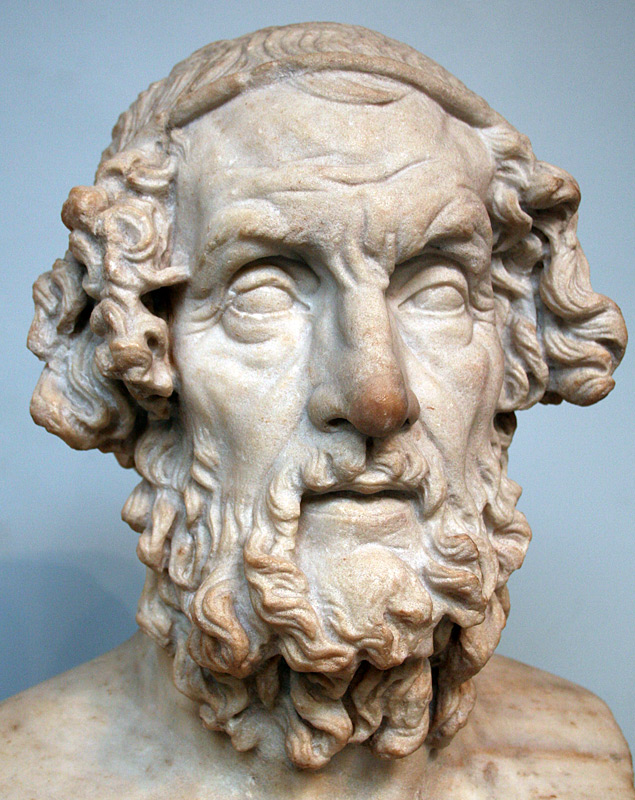Homérosz híres idézetei
Homérosz: Idézetek angolul
I. 599–600 (tr. Robert Fagles); hence the expression "Homeric laughter".
Iliad (c. 750 BC)
“Be both a speaker of words and a doer of deeds.”
IX. 443 (tr. Andrew Lang).
Iliad (c. 750 BC)
“Iron has powers to draw a man to ruin.”
XIX. 13 (tr. Robert Fagles); Odysseus to Telemachus.
Odyssey (c. 725 BC)
“It is the god who accomplishes all things.”
XIX. 90 (tr. R. Lattimore).
Iliad (c. 750 BC)
“Clearly doing good puts doing bad to shame.”
XXII. 374 (tr. Robert Fagles).
Odyssey (c. 725 BC)
“How ill, alas! do want and shame agree!”
XVII. 347 (tr. Alexander Pope).
Odyssey (c. 725 BC)
“The time for trusting women's gone forever!”
XI. 456 (tr. Robert Fagles).
Alexander Pope's translation:
: For since of womankind so few are just,
Think all are false, nor even the faithful trust.
Odyssey (c. 725 BC)
“Victory passes back and forth between men.”
VI. 339 (tr. R. Lattimore); Paris contemplates the fickleness of victory as he prepares to go into battle.
Iliad (c. 750 BC)
“Life and death are balanced as it were on the edge of a razor.”
X. 173–174 (tr. Samuel Butler).
Iliad (c. 750 BC)
“In form of Stentor of the brazen voice,
Whose shout was as the shout of fifty men.”
V. 785–786 (tr. Lord Derby).
Iliad (c. 750 BC)
“Welcome words on their lips, and murder in their hearts.”
XVII. 66 (tr. Robert Fagles).
Odyssey (c. 725 BC)
“But the gods give to mortals not everything at the same time.”
IV. 320 (tr. R. Lattimore).
Iliad (c. 750 BC)
“My soul
Shall bear that also; for, by practice taught,
I have learned patience, having much endured.”
V. 222–223 (tr. William Cowper).
Odyssey (c. 725 BC)
“Now sure enough the vile man leads the vile!
As ever, god brings like and like together!”
XVII. 217–218 (tr. G. H. Palmer).
Odyssey (c. 725 BC)
“Once a thing has been done, the fool sees it.”
XVII. 32 (tr. R. Lattimore).
Iliad (c. 750 BC)
“Sweet oblivion, sleep
dissolving all, the good and the bad, once it seals our eyes.”
XX. 85–86 (tr. Robert Fagles).
Odyssey (c. 725 BC)
“If I hold out here and I lay siege to Troy,
my journey home is gone, but my glory never dies.”
IX. 413 (tr. Robert Fagles); spoken by Achilles.
Iliad (c. 750 BC)
XV. 398–401 (tr. Alexander Pope).
E. V. Rieu's translation:
: Meanwhile let us two, here in the hut, over our food and wine, regale ourselves with the unhappy memories that each can recall. For a man who has been through bitter experiences and travelled far can enjoy even his sufferings after a time.
Odyssey (c. 725 BC)
“Helios, Sun above us, you who see all, hear all things!”
III. 277 (tr. Robert Fagles).
Iliad (c. 750 BC)
“Jove weighs affairs of earth in dubious scales,
And the good suffers, while the bad prevails.”
VI. 188 (tr. Alexander Pope).
Odyssey (c. 725 BC)
XVII. 446–447 (tr. R. Lattimore); Zeus.
Robert Fagles's translation:
: There is nothing alive more agonized than man
of all that breathe and crawl across the earth.
Iliad (c. 750 BC)
